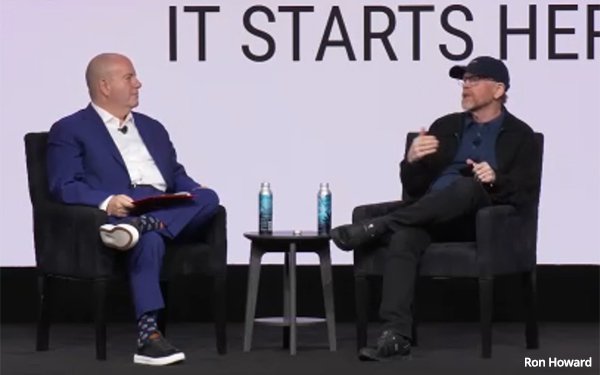
Advertisers have always used the words
“genuine” and “authentic” to describe content for a story well told.
Legendary filmmaker Ron Howard at the IAB ALM conference in Pam Springs, California, told the
audience: “I always look at stories and think, what’s the thematic value here or the audience relevancy? When you connect to an idea, you have an engagement, opinion and relations. And it
stirs curiosity.”
When people talking about it feel genuine, he said, there must be some sort of recognizable truth — a truth that is convention or surprise. If you
don’t deliver one or the other it feels empty, he added.
Howard spoke about the need to resonate with mass audiences and streaming. He spoke about creating hooks in television movies and
keeping commercial breaks in mind, which require cliffhangers, so viewers stay with the story.
advertisement
advertisement
I view commercials — from television to online — the same way: the need to keep
viewers engaged.
Advertisers need to experiment, Howard said.
AI has captured the attention across the advertising industry, from creativity to automation. It has entered in
almost every conversation around advertising, and Howard said it enters nearly every conversation in the movie industry as well.
Howard is the founder and CEO of Mercury Analytics, a
software company that creates research technology. He also founded Impact with Brian Grazer in 2020 as a LinkedIn-like platform to help Hollywood producers find crew members.
AI has
entered into the moviemakers’ lives creatively and as a research tool. It is something to bounce ideas off, he said.
When drilling down and looking at videos and stories, AI becomes an
effective tool to get feedback from.
At age 24, while he was part of the cast of "Happy Days," Howard and Anson Williams sold an inspirational story about a disabled girl who wants to fly and
a crusty female aerobatic pilot who goes behind her parents backs to achieve her dream. NBC and GE were part of the project and Betty Davis, 76 at the time, wanted to play a part.
Howard
really wanted to cast a young disabled woman in the role, although she had never acted professionally, believing it would bring authenticity to the script. Davis didn’t like that idea because
she wanted to work with a professional.
The first “real” conversation Howard had with Davis was about casting this young woman regardless of her lack of experience. “Well,
Mr. Howard, I wish you would reconsider,” Davis said, according to Howard.
“I have considered,” Howard said, adding that Davis and he talked it through a little bit.
“Mr. Howard, we will see how well it works out,” Davis said. “By the way, Ms. Davis, feel free to call me Ron,” he said.
“No, I will call you Mr. Howard until
I see if I like you or not,” Howard said, and then she hung up.
At this point Howard had not met Davis in person — and he did not until the first day of shooting in an authentic
location. It was an airfield in Plano, Texas in August, with the temperature hitting 100 degrees.
Authentic was uncomfortable for Davis because of the extreme temperatures. She wanted the crew
to build an entire airport on Stage 60 to shoot the content, because that’s how they did it “back in the day.” Davis had grown up in an era when movies were filmed in created spaces,
rather than shooting in practical locations with authenticity.
To make a long story short, after Ron wrapped the day, Davis told him, "Okay Ron, see you tomorrow'," and she slapped him
"on the ass."
A lot of the tech isn't an either-or thing, Howard said. “You will still appreciate real actors and certain types of productions shot on actual locations," he said. "A new
ascetic will be born around AI around the kind of product you like. Think about Anime or Pixar.”
George Lucas pushed digital decades ago because he was always frustrated that he
couldn’t get what was in his brain on the screen, Howard said, adding that AI is helping entertainment get things to the screen faster and cheaper.
If you have not been on X to see Min
Choi’s posts, I highly recommend it. Choi shows you the future of advertising.